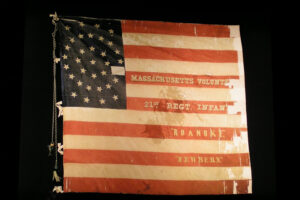
Thomas Plunkett was born in County Mayo in 1840. His parents emigrated to the United States in 1844 and settled in West Boylston, Massachusetts. When the American Civil War broke out, young Plunkett was working in a local shoe factory. Immediately answering the call of his adopted country, Plunkett enlisted in Company E of the 21st Massachusetts as a private. As a member of the 21st, Plunkett took part in some of the fiercest fighting of the war: Second Bull Run, Chantilly, and Antietam. However the 21st and now Sergeant Plunkett would face its greatest test at the Battle of Fredericksburg in 1862,
The misjudgments and mismanagement that led to the disaster which was the Battle of Fredericksburg are too numerous to detail in the space of this article. Suffice it to say that after taking over command of the Army of the Potomac from Major General McClellan who had been sacked for lack of aggressiveness, newly appointed commander Major General Ambrose Burnside went to the opposite extreme and devised a bold but complicated plan that soon came apart at the seams. The result was that the men of the 21st Mass found themselves on December 13, 1862 at the base of a hill overlooking the town of Fredericksburg known as Marye’s Heights. Though it was well known that the Confederates had days to fortify the position, Burnside fearing the political consequences to his career if he should withdraw, ordered wave after wave of Union troops forward only to break on the strong Confederate positions. It soon became the 21st Massachusetts turn.
The men of the 21st marched out onto the open plain below the heights where they formed their line, shivering in the cold as they had discarded the grey overcoats they had been issued less they be confused for Confederates. Before they even moved off, artillery fire from Marye’s Heights rained down upon them; solid shot claiming the head of an unfortunate private. It was a sign of what was to come as the 21st now began its grim advance toward the Confederate position.
Sergeant Plunkett had taken the position as a file closer behind the ranks to help maintain the unit formation and prevent straggling. Despite the unit moving at double time up the hill, the well-sited enemy artillery was taking a gruesome toll. The 21st Color Sergeant carrying the National Colors was shot and fell dead; the regiment’s Stars and Stripes falling to the ground. Plunkett immediately threw away his rifle and rushed forward to grab the flag. He began to carry it forward as bullets tore into its silk and nearly shattered the flagstaff in his hand; another ball tore through Plunkett’s cap, yet still he went on.
The fire was too heavy for Plunkett’s luck to last. As he neared the stone wall which defined the Confederate position, an artillery shell exploded directly in front of him. Three men surrounding him were killed instantly. Fragments of the shell nearly severed Plunkett’s right arm at the shoulder. Another fragment struck him in the chest, but glanced off a book that he was carrying in his waistcoat pocket saving his life but leaving an imprint on his chest that would be visible for the rest of his life. Another piece of shrapnel removed his left hand.
Amazingly, Sergeant Plunkett still stood standing. Planting his foot at the flag staff’s base and cradling the staff in the remnants of his arms

he screamed “Don’t let if fall boys! Don’t let it fall!”. Only when another member of the 21st took the colors from him did Plunkett permit himself to collapse to the ground. He would later remarkably stagger back to the Federal lines where both of his arms were amputated. Plunkett was tended during his recovery by another resident of Massachusetts, Clara Barton, who would go on to found the American Red Cross. Barton later recorded that when shown the flag that Plunkett had been carrying his blood “literally obliterated the stripes”. The 21st Mass. would lose a third of its strength that day at Fredericksburg.
After a lengthy convalescence, Thomas Plunkett was discharged from the Army on 9th March, 1864. He was awarded a full pension and the Medal of Honor on 30th March, 1866. He went on to marry and have two children, and would spend 15 years as a messenger in the State House at Boston where the bloodstained flag that he carried so nobly that December day still survives.
Sergeant Thomas Plunkett is one of 257 recipients of the Medal of Honor who list “Ireland” as their place of birth, more than the rest of the Foreign-born recipients combined. He lived at a time when many claimed that the Irish could never be true Americans or loyal to her flag. Thomas Plunkett proved those bigots wrong on both counts. In his memory we should be as steadfast in protecting and preserving our heritage as he was in protecting our flag.
